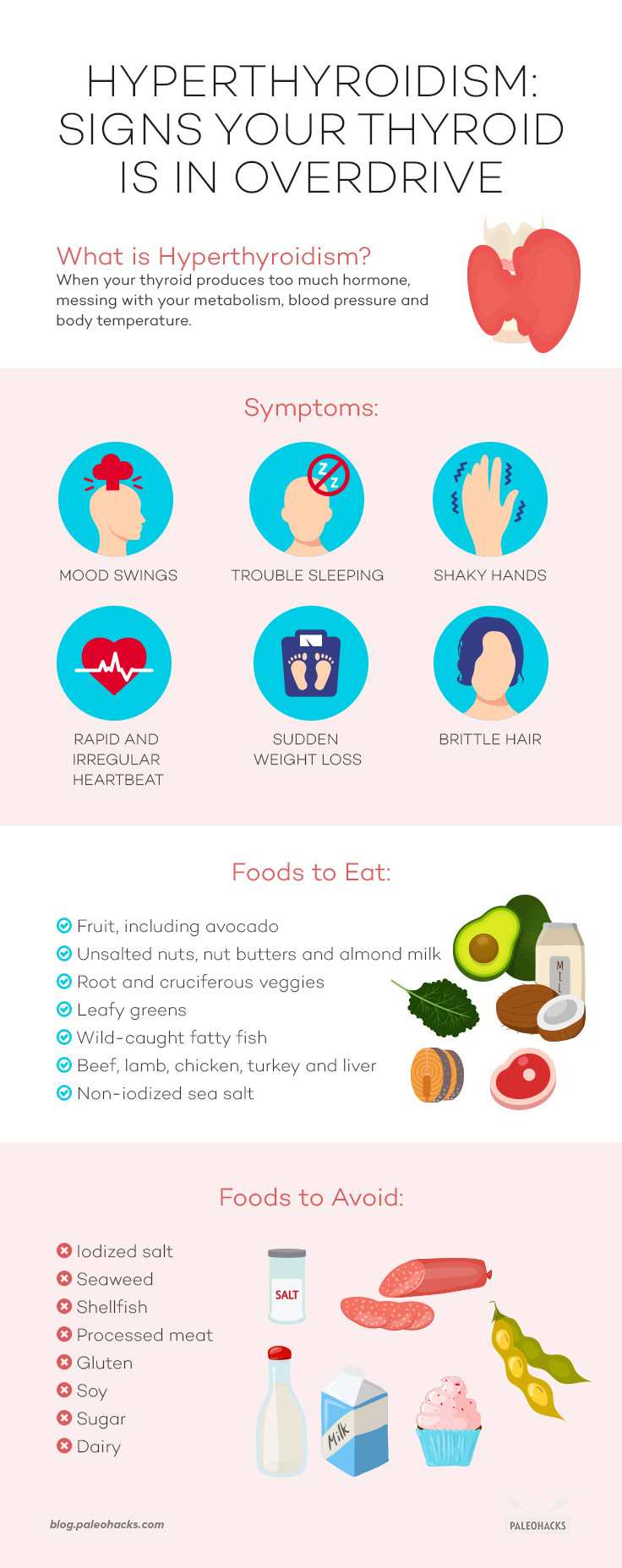If you have hyperthyroidism, you know what a roller coaster ride it can be. Here’s what might be causing your thyroid problems, what to eat, and what to avoid.
Dealing with thyroid troubles can be as confusing as they are annoying. If you’ve been experiencing symptoms like mood swings, fatigue, trouble sleeping, and brittle hair, you may have an overactive thyroid on your hands.
Here’s what it means to have hyperthyroidism, and how you can treat it both conventionally and naturally so you can get back to being you.
Are you struggling with a Thyroid condition? We’ve created a FREE guide that shows you how you can heal your thyroid.
Click here to get your FREE copy of our Thyroid Guide!
What is Hyperthyroidism?

Your thyroid is a small, butterfly-shaped gland located near the base of your throat, and it releases important hormones that regulate almost every function in our bodies, like metabolism, blood pressure, and body temperature. (1) Hyperthyroidism is a condition when your thyroid is overactive.
When your thyroid gland becomes “hyper”, it begins producing too much of a good thing. Hormones like thyroxine (T4) and triiodothyronine (T3), which are needed in balanced amounts for us to function optimally, flood our system, and cause a cascade of not-so-fun effects. (2)
Hyperthyroidism Symptoms
Have you been experiencing symptoms like hair loss and mood swings? You may be experiencing hyperthyroidism. While the symptoms vary widely, there are several common ones to look out for. These include:
- Nervousness and irritability
- Fatigue or muscle weakness
- Low tolerance for heat
- Trouble sleeping
- Shaky hands
- Rapid and irregular heartbeat
- Frequent bowel movements or diarrhea
- Sudden weight loss
- Goiter
- Brittle hair
According to research, women are twice as likely to develop hyperthyroidism than men. In addition, those who already have health conditions like diabetes or adrenal insufficiency, or those older than 60 years old, can be at a higher risk for developing hyperthyroidism. (3)
Hyperthyroidism Causes
One of the most common causes of hyperthyroidism is Graves’ disease, an autoimmune disorder that disrupts thyroid function. Graves’ disease is often hereditary, but excessive stress and various vitamin deficiencies can also be the root cause.
Another less common cause is nodule development on your thyroid. These are small lumps that may or may not be cancerous, and they can stimulate your thyroid to produce too much hormone.
Inflammation of the thyroid can also spur on hyperthyroidism. This is called thyroiditis, and it usually results from a bacterial or viral infection. (4)
Getting too much iodine in your diet can also cause hyperthyroidism, which is why you’ll see our recommendation to limit iodine-rich foods below. (5)
Hyperthyroidism Treatment Options
There are several conventional treatment options for hyperthyroidism. Your doctor may recommend that you take thyroid medications like methimazole (Tapazole) or propylthiouracil (PTU), which help block the thyroid hormones. He or she might also suggest taking beta-blockers to calm thyroid hormones.
In more extreme cases, you might consider getting a thyroidectomy or surgery to remove the thyroid gland. You can also take radioactive iodine by mouth, which damages and shrinks thyroid cells. Both of these options require being on thyroid replacement medication for the rest of your life since the thyroid is no longer there or functioning.
Aside from these conventional treatments, there are other natural options to try. Here are several supplements and herbs that show promise in managing hyperthyroidism (without killing your thyroid):
- Take L-carnitine. This amino acid may help decrease thyroid hormone production, and might even reverse symptoms. (6)
- Supplement with lemon balm. This herb in the mint family can bind with thyroid receptors to slow down hormone production. (7)
- Reduce stress. Grave’s disease and autoimmune disorders are linked to chronic stress. (8) Try stress-reduction activities such as meditation, yoga, and nature walks.
Note: Be sure to follow the recommended dosing instructions on your brand label for these herbs, and always talk to your doctor before starting a new regime if you suspect you have hyperthyroidism.
Foods to Eat

Many foods can help support thyroid health. In addition to consuming foods that nourish your thyroid, it’s also important not to overload on iodine-rich foods, which might make things worse. (9)
Cruciferous veggies like broccoli may help prevent your thyroid from absorbing too much iodine. (10) Foods rich in nutrients like iron, zinc, and healthy fats are also great for optimal hormone production. (11)
To help combat hyperthyroidism, eat plenty of:
- Fruit, including avocado
- Unsalted nuts, nut butters, and almond milk
- Root veggies like sweet potatoes, rutabaga, and cassava
- Cruciferous veggies like bok choy, broccoli, Brussels sprouts, and cauliflower
- Leafy greens like collards, spinach, and kale
- Olive oil, avocado oil, and coconut oil
- Mushrooms
- Wild-caught fatty fish
- Beef, lamb, chicken, turkey, and liver
- Non-iodized sea salt
Foods to Avoid
You’ll want to stay away from high-iodine foods like seaweed, and inflammatory foods like sugar, refined flour, gluten, dairy, and soy. Studies show that inflammation plays a role in disrupting thyroid hormone, so you definitely want to limit any foods that may aggravate your body. (12)
Specifically, be sure to steer clear of the following:
- Iodized salt
- Seaweed, including kelp, nori, kombu, and algae
- Shellfish like shrimp, crab, or lobster
- Processed meats like hot dogs or deli sandwiches
- Gluten, including most breads, wheat flour, and grains
- Soy, including tofu, tempeh, and seitan
- Sugar
- Dairy
The Bottom Line
Dealing with thyroid imbalances can feel like a roller coaster ride. However, there are many natural ways to help bring an overactive thyroid back into balance, such as with diet, herbs, and reducing inflammation. When in doubt as to whether you’re dealing with hyperthyroidism, be sure to contact your doctor before eliminating certain foods.
If your thyroid is still giving you trouble, try the Thyroid Reboot! This step-by-step guide by nutritionist Kinsey Jackson will help you increase your energy, shed unwanted fat, and clear your head so you can live your best, healthiest life ever. Start reversing your symptoms with the Thyroid Reboot today.




 No-Bake Raspberry Swirl Cheesecake Bars
No-Bake Raspberry Swirl Cheesecake Bars









Show Comments